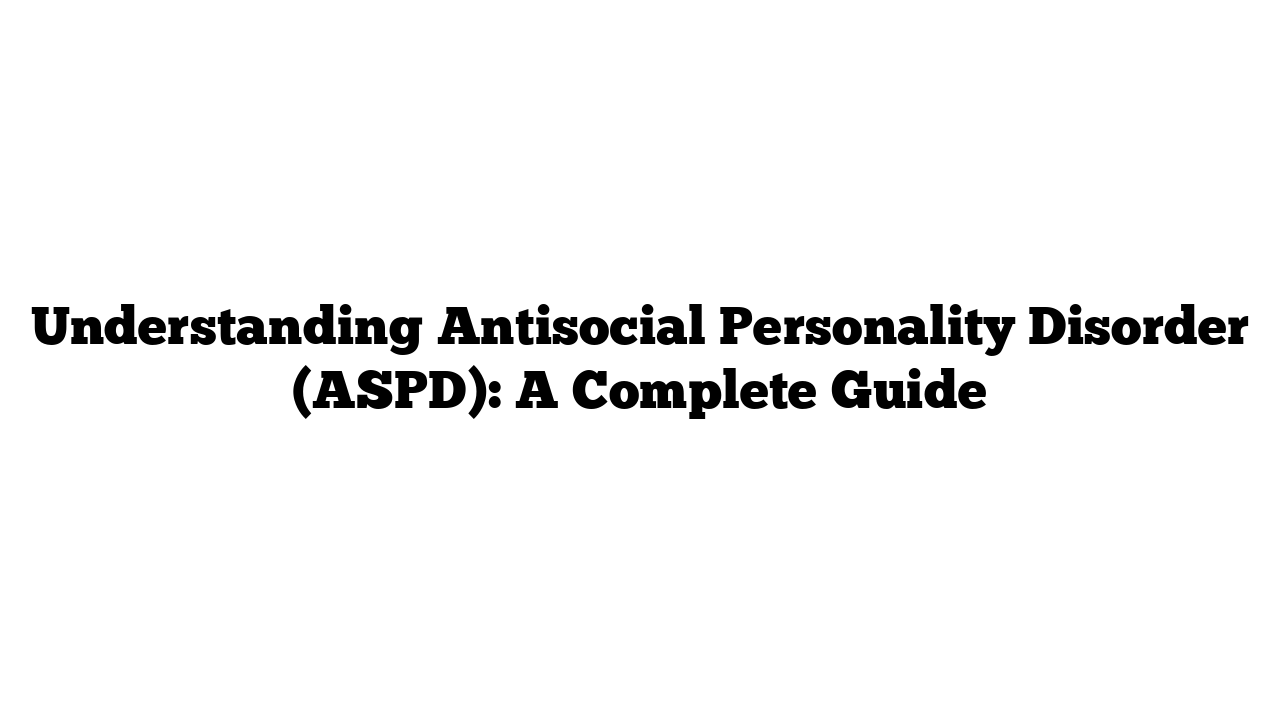Antisocial Personality Disorder (ASPD) is a complex mental health condition often misunderstood. People with ASPD tend to disregard the rights of others, break social norms, and exhibit behaviors that can be harmful or illegal. It’s a serious condition that can impact relationships, careers, and overall well-being. This article will explain ASPD, its causes, symptoms, diagnosis, and treatment options while offering insights into how society can approach this condition compassionately.
What is Antisocial Personality Disorder (ASPD)?
ASPD falls under the category of personality disorders in the Diagnostic and Statistical Manual of Mental Disorders (DSM-5). It is defined by consistent patterns of behavior that show a disregard for societal rules and the rights of others. People with this condition may struggle with empathy, manipulate others, or engage in unlawful activities.
Key Symptoms of ASPD
Understanding the symptoms can help in identifying the disorder. Common signs include:
- Disregard for Laws and Norms: Repeatedly breaking the law or acting in ways that violate social rules.
- Deceitfulness: Habitual lying, using aliases, or conning others for personal gain.
- Impulsivity: Making decisions without considering the consequences.
- Aggression: Physical fights, verbal abuse, or violent tendencies.
- Lack of Remorse: A noticeable absence of guilt after harming others.
- Irresponsibility: Neglecting obligations, whether financial, professional, or personal.
These behaviors often start during childhood or adolescence and persist into adulthood.
What Causes ASPD?
The exact causes of ASPD are not fully understood, but several factors may contribute:
- Genetic Influence: Studies suggest a possible genetic link.
- Brain Function: Abnormalities in brain areas related to decision-making and empathy, such as the prefrontal cortex, may play a role.
- Environment: Childhood abuse, neglect, or unstable family life are common contributing factors.
- Substance Abuse: Drugs and alcohol may exacerbate antisocial behaviors.
ASPD and the Law
In the USA, individuals with ASPD are more likely to have legal troubles. Their tendency to disregard rules can lead to repeated offenses. However, not all individuals with ASPD are criminals. Some manage to function in society by channeling their tendencies in socially acceptable ways.
Diagnosing ASPD
Diagnosing ASPD involves a thorough evaluation, often performed by a mental health professional. The process includes:
- Medical History: Reviewing past behaviors and any history of childhood conduct disorder.
- Psychological Assessment: Structured interviews and questionnaires to evaluate personality traits.
- DSM-5 Criteria: A formal diagnosis requires meeting specific criteria outlined in the DSM-5, such as consistent disregard for others’ rights since the age of 15.
Treatment Options for ASPD
Although ASPD is challenging to treat, some approaches can help manage symptoms and improve quality of life:
- Therapy:
- Cognitive Behavioral Therapy (CBT) helps patients recognize harmful thought patterns and behaviors.
- Group therapy can provide a controlled environment for social interaction.
- Medication: While no specific drug treats ASPD, medications can address related issues such as anxiety, depression, or aggression.
- Lifestyle Changes: Building healthier habits, such as regular exercise, a balanced diet, and mindfulness practices, can improve overall well-being.
- Support Systems: Family, friends, and community support are essential in creating a stable environment for individuals with ASPD.
Common Misconceptions About ASPD
- “All people with ASPD are criminals.”
- False. While criminal behavior is common, not everyone with ASPD engages in illegal activities.
- “ASPD is untreatable.”
- Treatment may be difficult but not impossible. With the right interventions, individuals can learn to manage their symptoms.
- “They are evil or heartless.”
- These stigmatizing labels prevent understanding. People with ASPD often face challenges rooted in their past experiences and biology.
How to Support Someone with ASPD
If you know someone with ASPD, here are ways to help:
- Educate Yourself: Understanding the condition is the first step.
- Set Boundaries: Establish clear and consistent limits.
- Encourage Professional Help: Gently suggest therapy or counseling.
- Avoid Enabling: Do not support harmful behaviors or allow manipulation.
The Importance of Awareness
Antisocial Personality Disorder requires a compassionate and informed approach. Misjudging people with ASPD only deepens their challenges. Awareness campaigns, better mental health education, and accessible treatment can make a difference.
For more tips, visit medicaltimes.io for helpful explanations and insights.
Top 10 FAQs on ASPD
1. Can ASPD be cured?
No, but symptoms can be managed with therapy and medication.
2. At what age is ASPD diagnosed?
Typically after age 18, but signs often appear earlier.
3. Is ASPD more common in men or women?
Studies suggest it’s more prevalent in men.
4. What is the difference between ASPD and psychopathy?
Psychopathy is considered a more severe form of ASPD, but not all with ASPD are psychopaths.
5. Can someone with ASPD feel emotions?
Yes, though they may struggle with empathy and remorse.
6. Are people with ASPD violent?
Not always. Some exhibit aggression, but others do not.
7. How does childhood behavior link to ASPD?
Conduct disorders in childhood, such as aggression or deceit, are often precursors.
8. What role does family play in ASPD?
Family history of personality disorders or instability can increase risk.
9. Is there hope for someone with ASPD?
Yes, with proper treatment and support, they can lead fulfilling lives.
10. Are there famous people with ASPD?
While not confirmed, some historical figures and criminals have shown traits consistent with ASPD.
